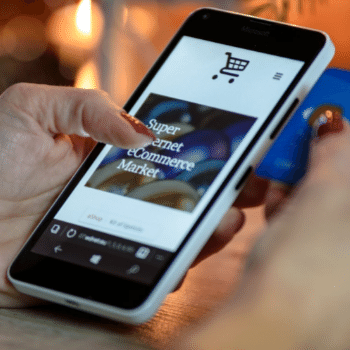How to Shop Online Safely
 Online shopping is convenient, quick, easy, and—often—more affordable than shopping in person. Of course, such convenience comes with a price, and as with most things related to the internet, that price is privacy and information security. By ordering a pair of shoes or a gift online, you could unknowingly be making it possible for hackers or digital thieves to steal your credit card info or other personal data: This is why shopping online safely is key.
Online shopping is convenient, quick, easy, and—often—more affordable than shopping in person. Of course, such convenience comes with a price, and as with most things related to the internet, that price is privacy and information security. By ordering a pair of shoes or a gift online, you could unknowingly be making it possible for hackers or digital thieves to steal your credit card info or other personal data: This is why shopping online safely is key.
Consumers spent over $861 billion online with U.S. merchants in 2020—a testament to online shopping's popularity and staying power. Still, you could land yourself in hot water if you don't practice good digital hygiene. Hackers have grown bolder and more creative than ever in a bid to trick personal information from you. Don't be a victim—read our best tips on staying safe while you shop online.
Related Items
1 - Wait until you're home to splurge
It can be tempting to do a quick digital shopping trip on Amazon if you're enjoying a latte at your local coffee shop, but if you're using public Wi-Fi, you could end up compromising your data and financial information.
If you're connected to an unsecured Wi-Fi connection, you might be giving sensitive data away without realizing it. Patient hackers who've joined the same Wi-Fi connection wait for opportunities to steal data from public users.
"Next time you shop online, wait until your internet connection is secure," says Cara Fuller, a connectivity expert with All Home Connections. If you're on the go and can't make it home before you buy, she says your second-best option is to use your mobile data plan and avoid public Wi-Fi altogether.
If you simply must do some online shopping while you're out and about, invest in a virtual private network (VPN), which is typically more secure than public Wi-Fi. But again, we highly recommend that you wait until you get home to make a purchase.
2 - Shop on trusted websites
It's inevitable—there will be a time when you'll shop online for something and come across a site that looks…not quite right. If you've ever encountered a site that sets alarm bells ringing, trust your instincts. There are many websites created with the sole intent of scamming online consumers and taking advantage of our desire to get a good deal.
Paul Bischoff, consumer privacy expert at Comparitech, recommends that consumers check that the web address starts with HTTPS—the "S" stands for secure—and that there is a closed padlock icon. Both indicate that your connection to the site is secure and mean that any data sent or received from the site is encrypted, so no third parties can access it.
Hackers are crafty, and some even obtain site certificates to make their malicious website look authentic. Make sure to review the certificate information and check for safeguards before surfing a suspicious site.
3 - Disable Bluetooth and Wi-Fi on your phone
Creepily enough, if you shop online while you're out and about, companies will use your connected device's Wi-Fi and Bluetooth capabilities to track your purchase history. While this isn't inherently unsafe, it can be unsettling to suddenly be on the receiving end of an ad for a pair of trainers just minutes after buying a pair of them online.
There are genuine online safety concerns related to Bluetooth, so if you don't need to use Bluetooth, turn it off. If you keep your Bluetooth turned on while you're out in public, hackers can easily view any networks you've connected to, create a fake version of it, and trick your device into connecting to a hacker's Bluetooth device. This paves the path for a scammer to gain access to personal data such as passwords and credit card information.
4 - Use trusted communication channels
If you're on Amazon, eBay, or another online marketplace, Bischoff says it's important not to communicate or make transactions with merchants outside of official channels. If you pay for a product using a different payment method, this prevents an online marketplace, such as Amazon, from being able to mediate the transaction and refund you if something goes wrong.
Be wary if someone asks you to make payments outside of the standard marketplace, as this could be a sign of the scammer. Scammers will use many different tricks, like asking for payment via gift cards. If you're dealing with a merchant who seems aggressive in their efforts to have you pay outside of official channels, do not make a purchase, and consider reporting that merchant.
5 - Update apps you regularly use
Conveniently, many of our favorite online shopping websites have apps that simplify the purchasing process and provide other benefits to help shoppers save.
Most apps also give you the option to save your credit card information—that way you don't have to enter in your card numbers with every purchase. As convenient as this may be, there are a few cautionary words of wisdom that you should keep in mind if you regularly shop on apps.
According to Fuller, it's important to keep your apps up to date. Scammers can exploit any bugs or vulnerabilities in the app's software if you don't routinely update them, she says. Luckily, the solution is easy. Pay attention to any notifications that prompt you to update your apps and keep an eye on the apps that store your personal information.
Reproduced from: Is Online Shopping Safe? How to Shop Online Safely | Real Simple
